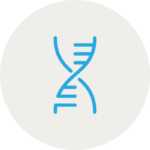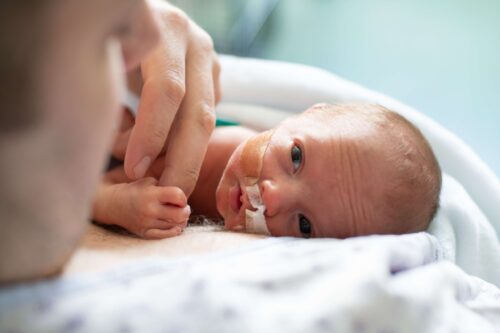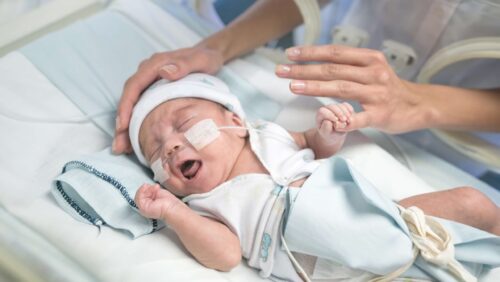Thank you for your dedication to finding answers for your patients.
When diagnoses are unclear, Whole Genome Sequencing (WGS) may provide answers to guide patient care and outcomes. Whether you’re coordinating testing, obtaining consent, or reviewing results, we hope these resources help streamline the process.
For informational purposes only. Not intended as medical advice.
When to Consider rWGS
rWGS may be appropriate for:
- No unifying diagnosis
- Intractable seizures
- Neonatal hypotonia
- Metabolic disturbances (e.g., hyperammonemia, profound hypoglycemia)
- Unexplained cardiac arrest
- Congenital cardiomyopathy
- Respiratory insufficiency at term
- Other unexplained congenital anomalies
- When a 5-day TAT for full written report is needed
When to Consider WGS
For persistent, unexplained findings:
- Developmental delay or intellectual disability
- Recurrent seizures without a known etiology
- Failure to thrive with suspected syndromic features
- Persistent hypotonia or movement abnormalities
- Congenital anomalies with no diagnosis
- Strong suspicion of a genetic disorder despite nondiagnostic panel testing
- Positive family history of a suspected genetic condition
- When a 21-day TAT is acceptable
Support for You & Your Patients
Our approach integrates multimodal data, AI-enhanced expert interpretation, and dedicated end-to-end support to inform your clinical care.

Detect variants across 20,000 genes to help explain a patient’s symptoms and a potential diagnosis by looking at multiple variant types.

RNASeq tailors the analysis of qualified* variants specific to the patient, contributing to a reduction in the number of variants of uncertain significance (VUS) and an increase in diagnostic yield.
*Meets our prediction algorithm criteria.

Our mitochondrial DNA sequencing provides enhanced sensitivity by detecting heteroplasmic variants present at levels as low as 5%. The increased resolution improves the clinical utility of testing and enhances diagnostic confidence.

Global MAPS®* (Metabolomic Assisted Pathway Screen), analyzes hundreds of metabolites to identify changes or irregularities in biochemical pathways not currently detected by routine clinical or genetic testing.

We use supplemental testing methods to assess 29 high impact STR disorders.

The support of comparator genomes from the parents (duo/trio) may help explain the patient’s condition. Requires comparator samples from either or both parents – only available with duo and trio WGS formats.

Our proprietary analysis pipeline is integrated with an industry leading AI solution to accelerate candidate gene variant prioritization – leveraging globally esteemed databases and curated clinical literature to reveal and support the underlying cause.

Baylor Genetics offers patient and provider support that extends beyond testing. Our services include assistance with insurance and financial options, access to genetic counseling after certain results, physician-initiated reanalysis as knowledge evolves, and help coordinating phlebotomy services. We also provide multiple testing formats, including Duo, Trio, Quad, and rapid testing to help identify the genetic basis of rare disease.
Our WGS assay is PCR-free, run at 40x genome-wide coverage, and is aligned to the GRCh38 reference genome and includes:
- Detects SNVs, indels, CNVs, STRs, and mitochondrial genome variants in exonic, intronic, and noncoding regions
- Includes UPD analysis (when both parents are tested as part of trios and quads)
- Reporting of findings in genes with no known disease association (when both parents are tested as part of trios and quads) Companion testing for BG WGS:
- Global MAPS® metabolomic profiling (test code 4900/4901)
- WGS reanalysis (test code 1897)
Optional:
- RNA sequencing for reclassification of eligible variants
- Reporting of ACMG Secondary Findings (each member of the family can individually be opted in)
- Reporting of other Incidental Findings not associated with the patient’s phenotype but that might impact their medical management
For NICU/PICU Patients
- Rapid Proband WGS (1829) CPT: 81425
Single-patient testing for urgent clinical scenarios - Rapid Duo WGS (1823) CPT: 81425 / 81426
Includes one parent to support rapid interpretation - Rapid Trio WGS (1822) CPT: 81425 / 81426 ×2
Includes both parents to improve yield in critical care - Rapid Quad WGS (1724) CPT: 81415 ×1, 81416 ×3
Includes primary and secondary findings for parents and sibling
For PEDIATRIC Patients
- Proband WGS (1810) CPT: 81425 ×1
Genomic analysis of a single patient for diagnostic evaluation - Duo WGS (1803) CPT: 81425 / 81426
Includes one parent to support variant interpretation - Trio WGS (1800) CPT: 81425 / 81426 ×2
Includes both parents to enhance variant interpretation - Quad WGS (1824) CPT: 1824: 81425 ×1, 81426 ×3
Includes primary and secondary findings for parents and sibling
Accepted Sample Types
- Blood
- Buccal swab
- Cord blood
- Skin fibroblast
- Extracted DNA
- Saliva
Turnaround Time (TAT)
- Rapid: Written results starting at 5 business days
- Standard: Approximately 3 weeks
Whole Genome Sequencing (WGS) / Whole Exome Sequencing (WES) Specimen Requirements
The sample types below are acceptable for all postnatal WGS and Rapid WGS.
TYPE |
REQUIREMENTS |
SHIPPING CONDITIONS |
|
|---|---|---|---|
Blood |
Draw blood in an EDTA (purple-top) tube(s) and send 3–5 cc for adults/children or 3 cc for infants
| Ship at room or refrigerated temperature in an insulated container by overnight courier. Do not heat or freeze. |
|
Buccal Swab |
Collect with ORAcollect•Dx (OCD-100) self-collection kit (provided by Baylor Genetics with instructions). We highly recommend the sample be collected by a healthcare professional. |
Ship at room temperature in an insulated container by overnight courier. Do not heat or freeze. |
|
Cord Blood |
Draw blood in an EDTA (purple-top) tube(s) and send 3 cc. |
Ship at room or refrigerated temperature in an insulated container by overnight courier. Do not heat or freeze. |
|
Cultured Skin Fibroblast |
Send two T25 flasks at 80–100% confluence. |
Ship at room temperature in an insulated container by overnight courier. Do not heat or freeze. |
|
Extracted DNA |
Send at least 20μg of extracted DNA (minimal concentration of 50ng/μL; A260/A280 of ~1.7). |
Ship at room temperature in an insulated container by overnight courier. Do not heat or freeze. |
|
Saliva |
Saliva should be collected with an Oragene DNA self-collection kit. |
Ship at room temperature in an insulated container by overnight courier. Do not heat or freeze. |
Kaylee Harris, Lisa Salz, and the entire Baylor Genetics team are here to support you with urgent or complex cases while staying aligned with your clinical workflows and priorities.
Testing Guidance
As you develop internal protocols for WGS utilization, we can provide peer-reviewed literature, clinical guideline references, and test option summaries if needed.
Supporting Your Families
To help reduce administrative burden during the testing process, we offer non-clinical materials that may be useful when communicating with families or navigating coverage logistics.
Coverage & Financial Support Tools
- Baylor Health Plan is in-network
- Prior authorization, benefit verification, and appeals support
- Financial Assistance Form – English
- Financial Assistance Form – Spanish
- Letter of Medical Necessity – WGS
- Insurance and Billing Information
Consenting Your Patients
We recognize that the consent process can be time-consuming and sensitive. Our updated forms are designed to reduce complexity and improve clarity.
Baylor Genetics Consent Forms
Access our current consent forms here. We will make the new forms available here as soon as they are ready.
Ordering Tests
We listen to our clinicians, and to save you more time, we’re actively working to streamline the ordering process. Your feedback continues to shape these improvements.
Baylor Genetics Portal
Orders are placed through our secure online portal, where you can upload documentation, track progress, and access reports.
Reminders
- Use the ordering physician’s registered email address
- Upload clinic notes, insurance cards, and signed consent before submitting
Steps
- Log in at orders.baylorgenetics.com
- Search for the test and click Add to Order
- Go to your cart and select Move to Order
- Complete required fields, upload documents, and click Submit
- Track order status under Orders and download results under Reported
Epic Aura Integration
To reduce steps, save time, and fully embed genetic testing into your clinical workflow, you can enable Epic-based ordering through Baylor Genetics’ Epic Aura integration.
To initiate integration, contact Kaylee Harris
Once implemented, ordering and results are accessed directly in the EMR—no need to switch platforms or re-enter patient information.
- Requires coordination with your IT and Epic teams
- Standard implementation timeline: 4–8 weeks
- Streamlines ordering, documentation, and report retrieval within Epic
Case Study 1
Rapid Trio WGS identified a diagnosis in a 2-month-old with seizures and feeding difficulties
Case Study 2
For a critically ill 3-day-old, rWGS enabled timely decision-making
Case Study 3
STR expansion detected via rWGS in a NICU patient, enabling diagnosis of a rare disorder
Need support? Email info@baylorgenetics.com or call 1-800-411-4363
Kaylee Harris
Regional Account Executive South Texas
Lisa Salz
Senior Medical Science Liaison
More Information
Whole Genome Sequencing (WGS) / Whole Exome Sequencing (WES) Specimen Requirements
The sample types below are acceptable for all postnatal WGS and Rapid WGS.
TYPE |
REQUIREMENTS |
SHIPPING CONDITIONS |
|
|---|---|---|---|
Blood |
Draw blood in an EDTA (purple-top) tube(s) and send 3–5 cc for adults/children or 3 cc for infants
| Ship at room or refrigerated temperature in an insulated container by overnight courier. Do not heat or freeze. |
|
Buccal Swab |
Collect with ORAcollect•Dx (OCD-100) self-collection kit (provided by Baylor Genetics with instructions). We highly recommend the sample be collected by a healthcare professional. |
Ship at room temperature in an insulated container by overnight courier. Do not heat or freeze. |
|
Cord Blood |
Draw blood in an EDTA (purple-top) tube(s) and send 3 cc. |
Ship at room or refrigerated temperature in an insulated container by overnight courier. Do not heat or freeze. |
|
Cultured Skin Fibroblast |
Send two T25 flasks at 80–100% confluence. |
Ship at room temperature in an insulated container by overnight courier. Do not heat or freeze. |
|
Extracted DNA |
Send at least 20μg of extracted DNA (minimal concentration of 50ng/μL; A260/A280 of ~1.7). |
Ship at room temperature in an insulated container by overnight courier. Do not heat or freeze. |
|
Saliva |
Saliva should be collected with an Oragene DNA self-collection kit. |
Ship at room temperature in an insulated container by overnight courier. Do not heat or freeze. |
- PCR-Free based library preparation provides uniform genome sequencing coverage, for better accuracy in variant calling
- Analysis of coding and non-coding regions
- 29 Detectable STRs: NOTCH2NLC, ATN1, DIP2B, ATXN2, ATXN8OS, PABPN1, ATXN3, JPH3, TCF4, CACNA1A, DMPK, GLS, NOP56, CSTB, ATXN10, ATXN7, CNBP, HTT, RFC1, PHOX2B, PPP2R2B, ATXN1, TBP, C9orf72, FXN, AR, FMR1, AFF2 (Focused on clinically relevant pathogenic repeat expansions only)
- Detects CNVs 3+ exon resolution and in some instances lower than 3 exons depending on the region
- 40x sequencing coverage provides a higher level of accuracy and reliability for identifying genetic variants
- Multivariant Coverage (SNV, indels, CNV, STR, SV, mtDNA, paralogs)
Secondary and Incidental Findings
Medically actionable variants that might not be associated with a patient’s current disease still might provide important information for their medical management in the future. Baylor Genetics provides the option for the reporting of pathogenic and likely pathogenic variants in genes on the ACMG Secondary Findings list. In addition, other incidental findings unrelated to the patient’s phenotype but that might impact their medical management can be separately opted into. (Must Opt-in)
CAP Accredited and CLIA Certified
The tests described have been developed and their performance characteristics determined by the CLIA-certified laboratory performing the test. The tests have not been cleared or approved by the US Food and Drug Administration (FDA). CAP accredited, and CLIA certified.
It is important to understand that genetic tests, even if negative, cannot rule out every variant. Genetic testing, while highly accurate, might not detect a variant present in the gene(s) tested. This can be due to limitations of the information available about the gene(s) being tested, or limitations of the testing technology. It is not possible to exclude risks for all genetic diseases for you/your child and your family members. It is possible that even if the test identifies the underlying genetic cause for the disease in your family, this information may not help in predicting the progression of disease or change management or treatment of disease.





